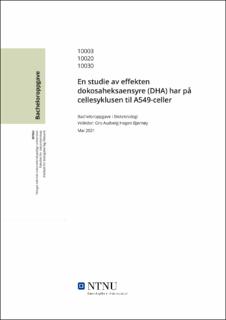| dc.contributor.advisor | Bjørnøy, Gro Audveig Hagen | |
| dc.contributor.author | Børve, Mari | |
| dc.contributor.author | Liff, Nadia Gudding | |
| dc.contributor.author | Trøen, Synne-Louise | |
| dc.date.accessioned | 2021-09-25T16:47:04Z | |
| dc.date.available | 2021-09-25T16:47:04Z | |
| dc.date.issued | 2021 | |
| dc.identifier | no.ntnu:inspera:82635201:82666627 | |
| dc.identifier.uri | https://hdl.handle.net/11250/2783518 | |
| dc.description.abstract | Forskning tyder på at omega-3-fettsyrene, særlig eikosapentaensyre (EPA) og dokosaheksaensyre (DHA), har en rekke helsemessige fordeler (1). Interessen for å undersøke effekten omega-3 kan ha på kreft har økt de siste årene, da ulike studier har vist at fettsyrene påvirker cellevekst og følsomhet i enkelte typer kreft (1, 2). Potensielt kan disse fettsyrene ta del i nye behandlingsformer som selektivt dreper kreftceller, i motsetning til konvensjonell behandling (3). I denne studien ble lungekreftcellene A549 brukt for å studere endringer i cellesyklus hos celler eksponert for DHA.
Cellene ble eksponert for ulike konsentrasjoner DHA og inkubert i 24 timer ved 37 °C og 5 % CO2 atmosfære. Forsøket ble gjennomført i tre delforsøk. Hvert delforsøk besto av to cellebrett med celler eksponert for henholdsvis 40 og 60 µg/ml DHA med tilhørende kontroller. For å undersøke om DHA har noen effekt på celleproliferasjonen til A549-cellene, ble cellesyklusen analysert ved hjelp av flowcytometer. Prosentandelen celler i hver cellesyklusfase i oljeprøvene ble kartlagt for å se om det hadde skjedd noen opphopning i syklusen som kunne tyde på en cellesyklusarrest. Sammenligningen av resultatene fra oljeprøvene og kontrollene viser en økt prosentandel celler i G1/G0-fasen for celler eksponert for 40 µg/ml DHA, og en vesentlig større økning for cellene eksponert for 60 µg/ml DHA. Dette tyder på at DHA kan ha en økt hemmende effekt på celleproliferasjonen med økende konsentrasjoner. | |
| dc.description.abstract | Research has shown that omega3 fatty acids, especially eicosapentaenoic acid (EPA) and docosahexaenoic acid (DHA), may have numerous health benefits (1). The interest in investigating how omega-3 may affect cancer has increased in recent years, as various studies have shown that these fatty acids affect cell growth and sensitivity in certain types of cancer (1, 2). Potentially these fatty acids may be part of new therapies in which cancerous cells are targeted selectively, as opposed to conventional therapies that act more globally on the organism (3). In this study, the A549 lung cancer cells were used to study cell cycle changes in cells exposed to DHA.
The cells were exposed to different concentrations of DHA and incubated for 24 hours at 37 °C and 5 % CO2 atmosphere. The experiment was divided in three sub-experiments. Each sub-experiment consisted of two cell culture plates with cells exposed to respectively 40 and 60 µg/ml DHA, and controls. To see if DHA has any effect on A549 cell proliferation, the cell cycle was analyzed by a flow cytometer. The percentage of cells in each phase were mapped to see if there had been any accumulation in the cycle that may indicate a cell cycle arrest. The comparison of the results from the oil samples and the controls shows an increased percentage of cells in the G1/G0 phase for those exposed to 40 µg/ml DHA and a significant increase for the cells exposed to 60 µg/ml DHA. The results may indicate that DHA has an increased inhibitory effect on cell proliferation with an increasing concentration. | |
| dc.language | nob | |
| dc.publisher | NTNU | |
| dc.title | En studie av effekten dokosaheksaensyre (DHA) har på cellesyklusen til A549-celler». | |
| dc.type | Bachelor thesis | |
